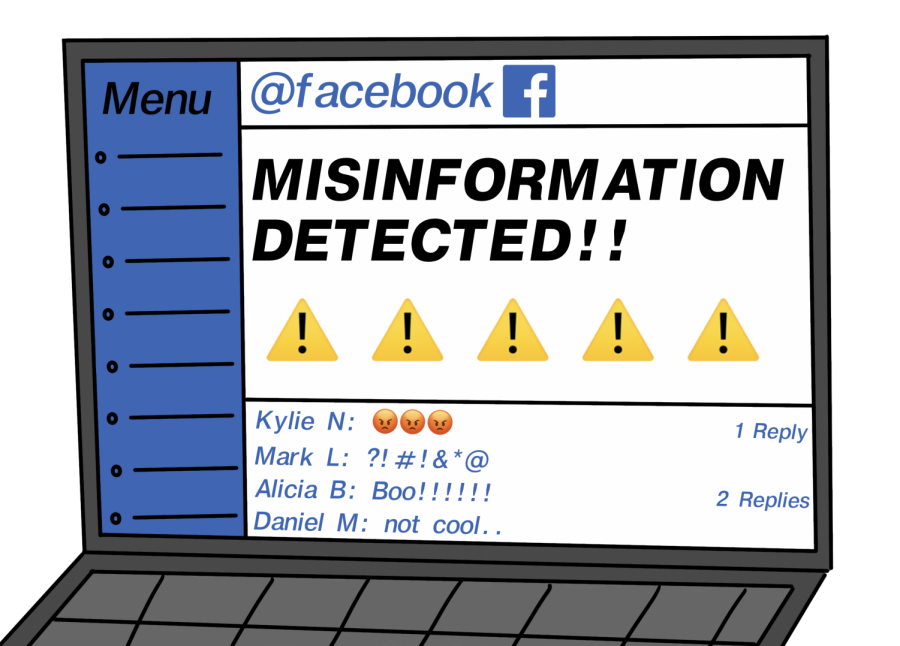FOCUS: The credibility of fact-checkers are being questioned as posts are flagged, tagged, and distrusted
Millions of people scroll the pages of Instagram and Facebook daily. With every post, they fall deeper and deeper into the rabbit hole, wrestling with the influence of Facebook and its daughter companies. Oftentimes, Facebook’s influence works to contort people’s beliefs, allowing them to fall victim to misinformation. This social dilemma is one that has proven difficult to solve.
Under the new overarching brand Meta, Facebook has chosen to continue its usage of third-party fact-checkers. According to the official Meta website, the non-partisan International Fact-Checking Network certifies fact-checkers. The process of reviewing a post for misinformation begins with a fact-checker’s own reporting. After various interviews with primary sources and discussions with consultants, Facebook will place warning labels on misinformation and limit a post’s persistence in the algorithm.
As posts are flagged, tagged and distrusted, many have begun to question the authenticity of fact-checkers. Devotees have sought to expose the ineffective nature of fact-checkers and their underlying political biases. One such is sophomore Diya Desai, who has noticed a rise in vaccine misinformation.
“COVID-19 misinformation is spreading faster than COVID-19 itself, disrupting public health efforts and distorting scientific guidance,” Desai said. “It’s just super important that they (Facebook) take action to prevent any sort of conspiracy theories.”
Desai cited a specific instance where Jessica Maltey Rivera, an epidemiologist, discussed a post of the New York Magazine’s cover story. Within, Nicholson Baker explored the COVID-19 lab leak hypothesis. The post was broadcasted 47 weeks ago. Even today, Desai claims the injustice of allowing this post to circulate continues.
The promulgation of COVID-19 misinformation on Facebook and its affiliate platforms is far from rare. According to a peer-reviewed study conducted by Harvard Kennedy School, 46.6 percent of posts on Facebook that mentioned vaccine misinformation worked counteractively to spread misinformation. The other 47.4 percent were fact-checked posts. Out of these, 18.9 percent of posts refuted the original false claim and did not reinstate it as true though 28.5 percent did.
“I feel like they’ve (fact-checkers) been very ineffective in what they do,” sophomore Nikhil Ramirkshnan said. “Sometimes I can see why they’d be a good idea to implement, but if they (Facebook and Instagram) want to implement them, it’d be efficient with both sides of the story taken into account with fact-checking.”
During the 2020 election season, Ramrikshnan’s Instagram feed was flooded with posts catering to the Republican party. He believes this is a byproduct of politically biased fact-checkers.
2020 was also a year of political turmoil, with a multitude of election fraud claims overhauling Facebook. At the announcement of mail-in ballots, incumbent Donald Trump tweeted such ballots were fraudulent. Twitter hastily marked the tweet, placing a “Get facts about mail-in ballots” label directly underneath. According to The BBC, Trump signed an executive order “removing some legal protections given to social media platforms” shortly afterward.
“That is a hot debate, whether or not freedom of speech should be, like, quote unquote, taken away… for the greater good,” junior Austin Wu said.
Additional effects of Facebook’s influence were revealed in an interview conducted by PBS. Within, PBS reporters asserted that hypotheses surrounding election fraud fueled the Jan. 6 insurrection. Facebook reportedly retracted its responsibility in the event. Yael Eisentatt, the interviewee and former head of election integrity for political ads at Facebook, strongly emphasized that Facebook was fully accountable for facilitating the riot by connecting rioters to “hate groups.”
As the reliability of fact-checkers is continuously questioned and the controversy seems unrelenting, many hope for reform and better protection against misinformation.
“I think it (backlash from fact-checkers) shows how divided we are as a society,” Desai said. “The rise in social media, I feel as though people are making stuff like a vaccine a very partisan issue, and that can be very detrimental to society and people’s health.”


